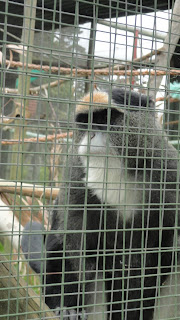A
pioneer is one who leaves all behind in hope of a better life ahead. Nations
streamed to what was known as the New World. They came from Africa, Europe, and
Asia to escape drudgery, persecution, and some against their own will, but
they came all the same. They took Paul’s words of Philippians 3:13-14 truly: one thing [I do], forgetting those things which are
behind, and reaching
forth unto those things which are before.
 In
order to embrace the destiny and new life which lay ahead they had to forget
their country and people. Like Ruth, the quintessential pioneer, they needed to
forget their people, their land, and their god to find the new life before
them: "Wherever you go,
I will go; wherever you live, I will live. Your people will be my people, and your God will be my God. (Ruth 1:16).
In
order to embrace the destiny and new life which lay ahead they had to forget
their country and people. Like Ruth, the quintessential pioneer, they needed to
forget their people, their land, and their god to find the new life before
them: "Wherever you go,
I will go; wherever you live, I will live. Your people will be my people, and your God will be my God. (Ruth 1:16).
Being
a pioneer meant being prepared. One had to anticipate the dilemmas and problems
one might encounter on the trail. Life
is a similar kind of journey, which at times, with its twists and turns,
requires us to anticipate the challenges which may lie ahead. "But don't begin until you count the cost," Jesus warned; "for who would begin
construction of a building without first calculating the cost to see if there
is enough money to finish? (Luke 14:28).
The pioneer needed to bring barrels to collect
water and simple cooking supplies such as cornmeal, yeast, bacon, rice, and
beans. All of the pioneers traveled with supplies such as needles, pins,
leather, scissors, and all the necessary sundries to sew and make clothes. In
essence, they took as much and as many supplies as possible on the journey.
They would have been destined for failure if
they had not had the foresight to carry dried meat, potatoes, crackers, and
yeast for baking. The family cow made the trip as well for it provided the
necessary milk for growing children and nursing babes who were still suckling.
Even a tin of chocolate might be taken for special occasions. A hen or two would
provide the eggs that would serve as a good source of protein and a necessary
ingredient in cooking.

No
malls were nearby so leather was brought to fix worn-down shoes. They also made
their own repairs to wagon wheels and such, so they brought nails, hammers,
saws, knives, and the utilitarian string. When they set off toward their
destination, they did not know exactly what awaited them, but they attempted to
anticipate and prepare to meet their most basic needs.
Yet, we seem to little
resemble the pioneer as we carelessly get into our wagons so to speak and
head out on the trial of life. We give little thought to the gear that we will
need to mend the broken parts of our hearts. Like a pair of broken worn shoes
whose tread is gone, our hearts keep on trudging on the miles but are never
restored, never mended.
We
fail to sharpen our skills and intellect. No pioneer worth his or her salt would
go on the trail without a good set of knives and the ability to sharpen them,
but many people spend little time investing in sharpening people skills,
relationship building, and cognitive growth.
The story of the pioneer provides a worthy allegory to life, and for next few installments, I will examine the tried and true virtues exhibited by the pioneer.
A Bourgeoning Pioneer,
MJ
A Bourgeoning Pioneer,
MJ
.


